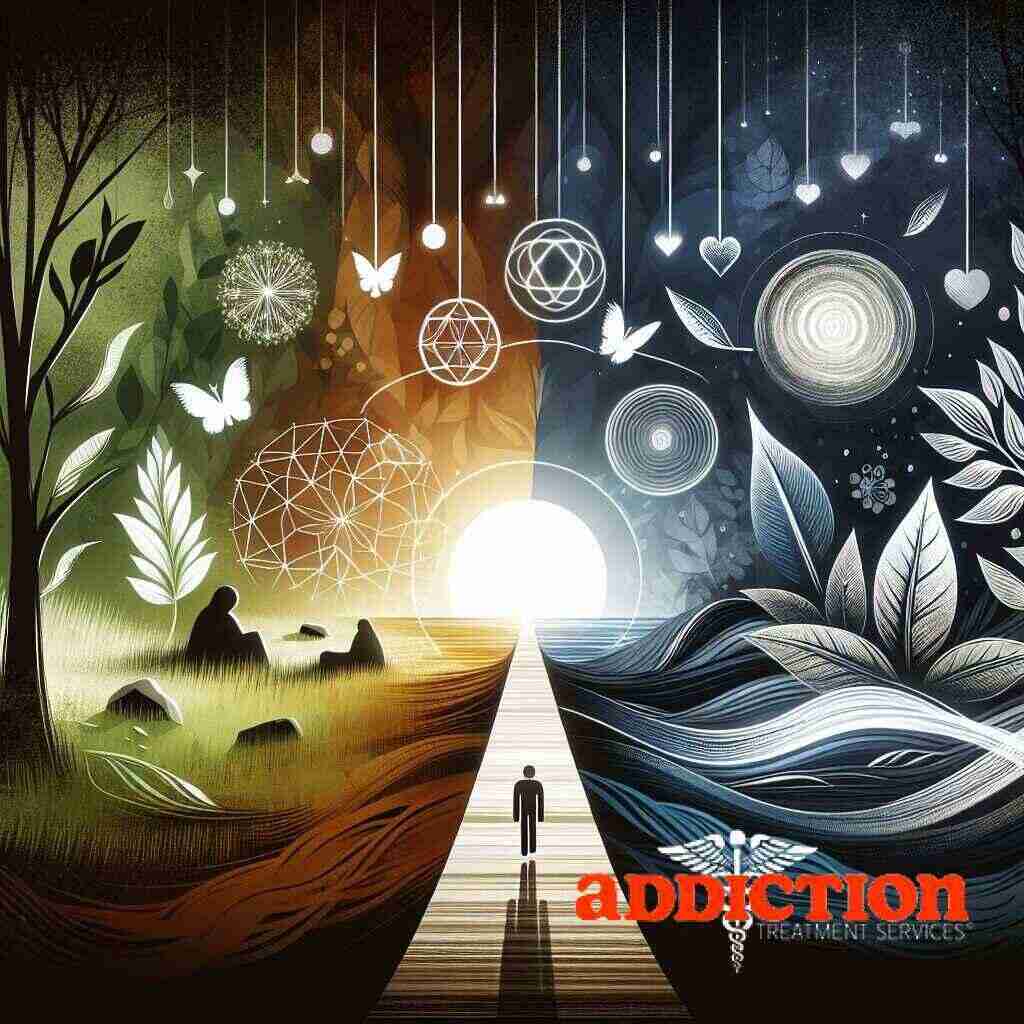 Posted On: 04/19/2024
Posted On: 04/19/2024Embarking on the Journey to Recovery in New Jersey
Understanding the landscape of addiction in NJ
The state of New Jersey, with its diverse demographics and bustling urban centers, has not been immune to the nationwide crisis of addiction. Substance use disorders touch every corner of the Garden State, from the quiet suburban towns to the vibrant cities. In recent years, New Jersey has seen a significant rise in both drug addiction rates and opioid-related overdoses, underscoring the urgent need for accessible and effective addiction treatment services. This situation has led to a concerted effort from both public health officials and private organizations to expand treatment options for those battling addiction. Among these options, Intensive Outpatient Programs (IOPs) have emerged as a promising pathway to recovery, offering a flexible yet intensive approach tailored to accommodate the complexities of modern life.
Why choose an Intensive Outpatient Program (IOP)
Choosing the right treatment modality can be a pivotal decision in one’s recovery journey. Intensive Outpatient Programs (IOP) in New Jersey provide a middle ground for many who require more support than traditional outpatient care but cannot commit to residential treatment due to personal or professional obligations. IOPs allow individuals to maintain closer connections with their families and communities, which can be crucial for recovery. The structured nature of IOPs, with their scheduled therapy sessions and support groups, offers the rigorous framework needed for effective recovery while enabling patients to apply and practice their coping strategies in real-world situations. This balance fosters a sense of autonomy and empowerment, critical components for long-term sobriety.
The role of Addiction Treatment Services in your recovery path
Addiction Treatment Services steps in as a vital resource navigating the vast landscape of addiction treatment options in New Jersey. Understanding the overwhelming nature of finding the right treatment amid crisis, we offer a comprehensive directory of reputable IOPs and other treatment modalities across New Jersey. Our platform is designed to simplify the search process, providing detailed information on various programs, including those specializing in medication-assisted treatment, dual diagnoses, and family support. We believe in the importance of informed choices and tailored treatment plans, recognizing that each journey to recovery is as unique as the individual undertaking it. By connecting individuals and their families with the right resources and support, Addiction Treatment Services aims to be a guiding light on the path to recovery, helping to navigate the challenges of addiction with compassion and understanding.
What are Intensive Outpatient Programs (IOPs)
Defining IOP and its objectives
Intensive Outpatient Programs (IOPs) serve as a critical bridge in the addiction treatment continuum, offering a structured therapy environment while allowing clients to engage in their regular daily activities. An IOP’s primary objective is to provide individuals with the tools and support needed to overcome substance use disorders without the need for 24-hour care. Typically, these programs include a mix of group therapy, individual counseling, and educational sessions focused on relapse prevention, coping strategies, and life skills development. Such a design caters to those who have a stable living situation and a supportive network, making IOPs a flexible yet effective solution in the battle against addiction.
How IOPs differ from residential treatment
The key difference between Intensive Outpatient Programs and residential treatment centers lies in the living arrangements and intensity of care. While residential or inpatient treatment requires clients to live on-site at the facility, IOPs allow individuals to live at home or in a sober living environment. This aspect of IOPs is particularly beneficial for those who cannot take an extended leave from work, school, or family commitments. Despite being less time-intensive than residential treatment, IOPs still provide a high level of care, including access to medical and mental health professionals, support groups, and ongoing monitoring of recovery progress. The flexibility of IOPs in scheduling therapy sessions during the day or evening also ensures that individuals can continue with their everyday responsibilities while receiving the necessary treatment.
The importance of personalized treatment plans
A cornerstone of effective addiction treatment, particularly within IOPs, is the implementation of personalized treatment plans. Recognizing that each individual’s journey to recovery is unique, IOPs focus on tailoring treatment to fit the specific needs, goals, and circumstances of each participant. This approach includes a comprehensive assessment at the start of the program, enabling therapists and counselors to identify the underlying causes of addiction, co-occurring mental health disorders, and other factors influencing the individual’s substance use. Personalized treatment plans can adapt over time as participants make progress, ensuring that the provided support remains relevant and effective throughout recovery. This personalization not only enhances the treatment outcome but also empowers individuals to take active roles in their healing process, laying a strong foundation for long-term sobriety and well-being.
Key Components of IOPs in NJ
Group therapy sessions
Group therapy is a cornerstone of Intensive Outpatient Programs (IOPs) in New Jersey, fostering a sense of community and shared understanding among participants. Within the supportive and confidential setting of group therapy sessions, individuals are encouraged to share their experiences and challenges, gaining insights not only from professional therapists but also from the stories and coping strategies of peers. This collaborative environment is instrumental in promoting empathy, reducing feelings of isolation, and enhancing social skills-all vital aspects of sustainable recovery. Furthermore, the diversity of group members enriches the therapeutic experience, allowing for a broad spectrum of perspectives and solutions to be explored.
Individual counseling
While the communal aspect of group therapy is invaluable, individual counseling in New Jersey’s IOPs addresses the nuanced and personal aspects of addiction recovery. Tailored to meet each participant’s unique needs and recovery goals, individual sessions offer a private space to delve into deeply personal issues, trauma, and any co-occurring mental health conditions under the guidance of a skilled counselor. This personalized approach ensures that the root causes of substance use disorders are addressed, facilitating a more comprehensive and meaningful healing process. The confidential nature of these sessions also enables clients to build trust with their counselor, fostering open communication and self-reflection, essential components of effective therapy.
Medication-assisted treatment New Jersey
New Jersey’s approach to battling substance use disorders includes the integration of medication-assisted treatment (MAT) within many of its IOPs. MAT combines the use of FDA-approved medications with counseling and behavioral therapies to provide a “whole-patient” approach to the treatment of substance use disorders. This methodology has proven to be highly effective, particularly in the treatment of opioid and alcohol dependency, by alleviating withdrawal symptoms, reducing cravings, and normalizing body functions. The judicious use of medications as part of an IOP allows for a smoother transition into sobriety, mitigating some of the physical barriers to recovery and enabling a stronger focus on the psychological aspects of addiction treatment.
Relapse prevention strategies
A pivotal element of IOPs in New Jersey is the emphasis on relapse prevention strategies. Given the chronic nature of addiction, the risk of relapse is a significant concern that requires proactive planning and support. IOPs equip participants with a comprehensive set of tools and techniques designed to recognize and manage triggers and high-risk situations. From cognitive-behavioral strategies to mindfulness training, clients learn to navigate the complexities of life without reverting to substance use. These programs also stress the importance of building a healthy lifestyle and supportive relationships as key foundations for long-term recovery. By prioritizing relapse prevention within the curriculum, IOPs in NJ empower individuals with the confidence and skills necessary to sustain their sobriety well beyond the duration of the program.
Selecting the Right IOP in New Jersey for Your Needs

Factors to consider
When embarking on the path to recovery through an Intensive Outpatient Program (IOP) in New Jersey, understanding the crucial factors that influence the success of your treatment is paramount. Firstly, considering the location of the program is essential. A facility that is easily accessible increases your chances of consistent attendance and engagement. Equally important is the program’s approach to treatment. Look for programs that offer a blend of traditional and innovative therapies tailored to your specific needs. Additionally, the staff’s expertise and compassion play a significant role in providing a supportive environment conducive to recovery. Consider programs that include family involvement, recognizing the vital support system they represent. Lastly, assess the flexibility of the program schedule to ensure it aligns with your personal and professional commitments. Making an informed decision involves weighing these factors carefully to find an IOP that resonates most with your journey to sobriety.
Understanding accreditation and what it means for quality of care
Accreditation is a hallmark of excellence in addiction treatment and a critical factor in selecting the right Intensive Outpatient Program in New Jersey. Accrediting bodies such as The Joint Commission or the Commission on Accreditation of Rehabilitation Facilities (CARF) set rigorous standards for care, safety, and organizational management. An accredited treatment center has undergone a thorough evaluation process, proving its commitment to high-quality care and continuous improvement. Accreditation signals that a program adheres to best practices in addiction treatment, ensuring that patients receive evidence-based, ethical, and effective care. When researching IOP options, look for accreditation statuses as a reliable gauge of a program’s quality and its dedication to achieving favorable outcomes for its participants.
How to evaluate the success rate of a program
Evaluating the success rate of an Intensive Outpatient Program can be challenging, yet it is crucial for selecting the best possible option for your recovery in New Jersey. Begin by seeking programs that transparently share their outcomes, including rates of program completion, relapse, and long-term recovery. Many reputable programs conduct follow-up surveys with alumni and openly discuss these findings with prospective patients. Additionally, consider the measures the program uses to define success, ranging from sobriety milestones to improvements in mental health, employment, and family relationships. Engaging with the program’s alumni through support groups or online forums can also provide invaluable first-person insights into the effectiveness and quality of care. Lastly, inquire about the program’s adherence to evidenced-based treatment modalities, as these are often correlated with higher success rates in addiction recovery.
Understanding the Role of Support Systems
Family Support in Addiction Treatment
The inclusion of family support in addiction treatment significantly enhances the effectiveness of recovery efforts. A familial system that understands the intricacies of substance use disorders and the recovery process can offer an invaluable sense of empathy, encouragement, and accountability to the individual battling addiction. Programs often integrate family therapy sessions, which serve to mend the fractures that addiction has caused within family dynamics, fostering a healthier environment conducive to recovery. Education on substance misuse and coping strategies for family members further empowers the entire family unit, making them a supportive pillar for the individual in their journey towards sobriety. Engagement in family support groups can also extend this network, offering insight and shared experiences with other families going through similar situations.
Building a Recovery Community
The efficacy of recovery from substance use disorders is profoundly amplified by the presence of a strong, supportive community. Building a recovery community involves connecting with others who are on similar paths, creating an environment of mutual understanding and shared growth. Intensive Outpatient Programs (IOPs) in NJ skillfully facilitate this connection, initiating group therapy sessions and enhancing social networks among participants. Additionally, local recovery events and meetings, such as those offered by recovery support services New Jersey, cultivate a broader sense of belonging and encouragement. Within this community, individuals find a rich source of inspiration, learning from the successes and challenges of others, which can significantly bolster their own resolve and progress in recovery.
Recovery Support Services New Jersey
New Jersey boasts a comprehensive array of recovery support services, which are essential in navigating the complexity of addiction recovery. These services, encompassing everything from sober living arrangements to recovery coaching and peer support groups, provide ongoing assistance beyond the initial phases of treatment. Participating in recovery support services in New Jersey ensures that individuals in recovery can access resources and guidance at any stage of their journey, fortifying their ability to maintain sobriety. Emphasizing the importance of community and connection, these support services also link individuals with a network of peers who understand the unique challenges of addiction recovery, fostering a supportive environment that encourages perseverance and resilience. By leveraging these services, individuals in recovery can significantly enhance their chances of sustained success, making them a critical component of the holistic recovery process in New Jersey.
Dual Diagnosis Treatment in IOPs
Addressing both mental health and substance use disorders
In the realm of addiction recovery, addressing solely the substance use disorder (SUD) without considering co-occurring mental health issues is akin to treating only the surface of a deep wound. The interconnected nature of mental health and substance use disorders necessitates an approach that comprehensively tackles both aspects for a sustainable recovery. This approach, widely known as dual diagnosis treatment, underlies the philosophy of many Intensive Outpatient Programs (IOPs) in New Jersey. By acknowledging the dual facets of addiction and mental health, IOPs are better equipped to provide the multifaceted care required. For instance, an individual battling depression alongside alcoholism receives simultaneous treatment for both, recognizing that untreated depression can serve as a trigger for alcohol use and vice versa. Through this integrated approach, participants are afforded a more holistic healing journey, paving the way for a more effective and long-lasting recovery.
The benefit of integrated treatment plans
Integrated treatment plans stand at the core of dual diagnosis treatment, merging strategies and therapies designed to address substance use disorders and mental health issues concurrently. This method is pivotal in ensuring that the treatment is not just comprehensive but also highly personalized, catering to the intricate needs of individuals facing dual diagnoses. For individuals in New Jersey’s Intensive Outpatient Programs, the incorporation of therapies such as Cognitive Behavioral Therapy (CBT), Dialectical Behavior Therapy (DBT), and medication-assisted treatment, among others, facilitates the management of symptoms linked to both mental health conditions and substance dependence. The collaborative nature of these treatment plans promotes a more profound understanding of one’s behaviors and thought patterns, empowering individuals to develop healthier coping mechanisms. The alignment of mental health therapy with addiction recovery efforts amplifies the efficacy of treatment outcomes, offering hope and a clear path forward for those navigating the complexities of dual diagnosis.
Finding dual diagnosis treatment NJ facilities
Identifying a suitable dual diagnosis treatment facility in New Jersey that aligns with your specific needs can be a decisive step towards a successful recovery. The search begins with recognizing facilities that are explicitly equipped to handle dual diagnosis cases, showcasing a dual diagnosis treatment NJ expertise in both their staffing and program structures. Such facilities typically have a multidisciplinary team that includes psychiatrists, psychologists, addiction specialists, and therapists who collaborate to design and implement integrated treatment plans. It’s crucial to inquire about the specific therapies offered, ensuring they encompass a range of evidence-based practices tailored to treat dual diagnoses adequately. An essential aspect of this search involves evaluating the program’s flexibility to adapt to evolving needs as recovery progresses. Equally, the facility’s atmosphere, support systems, and post-treatment planning are significant considerations that can influence the overall efficacy of the dual diagnosis treatment experience. By carefully evaluating these factors, individuals seeking dual diagnosis treatment in New Jersey can find a program that not only addresses the breadth of their needs but also fosters an environment conducive to meaningful and sustained recovery.
Incorporating Holistic Therapies in Addiction Recovery
Exploring Alternative Therapies
The journey to recovery from substance use disorders is as multifaceted as the individuals who embark on it. Recognizing this, an increasing number of addiction treatment services in New Jersey are integrating holistic therapies into their programs, broadening the scope of traditional addiction treatment methods. Holistic therapies aim to heal the mind, body, and spirit in unison, addressing the complex interplay between these aspects of an individual’s well-being that contributes to substance misuse. Common alternative therapies found in Intensive Outpatient Programs (IOPs) include yoga, meditation, art therapy, equine-assisted therapy, and acupuncture. These practices offer a respite from the rigors of conventional therapy sessions, creating a balanced and comprehensive treatment experience. By exploring the healing potential of these alternative therapies, individuals gain access to a broader toolkit for managing stress, emotional pain, and triggers, enhancing their ability to navigate the challenges of recovery with grace and resilience.
How Holistic Treatments Complement Traditional Methods
Integrating holistic treatments into the addiction recovery process serves as a complement to more traditional methods such as cognitive-behavioral therapy and medication-assisted treatment. This amalgamation presents a “whole-person” approach to healing, acknowledging the intricate link between mental, physical, and emotional health in overcoming addiction. For instance, meditation and mindfulness practices bolster mental health by fostering a state of calmness and emotional balance, which is pivotal in managing cravings and reducing the risk of relapse. Similarly, physical activities like yoga not only improve physical health but also enhance self-awareness and self-regulation, critical skills in maintaining sobriety. By blending these holistic treatments with traditional therapy sessions, addiction treatment centers in NJ enrich the recovery experience, offering more pathways to individuals for achieving lasting wellness and sobriety. This integrative approach underscores the belief that healing must occur on all levels to effect real and enduring change.
Holistic Addiction Treatment New Jersey Options
New Jersey offers a diverse array of holistic addiction treatment options, catering to the growing demand for comprehensive care that goes beyond the confines of conventional therapies. These options are readily available across the state, from the serene shores of the Jersey coast to the bustling urban centers. Holistic addiction treatment centers provide a peaceful and supportive environment where individuals can explore various alternative therapies tailored to their recovery needs. Whether it’s participating in expressive arts to process emotional traumas, engaging in acupuncture to alleviate withdrawal symptoms, or finding solace in spiritual counseling to rebuild inner strength, New Jersey’s holistic IOPs are equipped to facilitate this integrative healing journey. For those seeking a broader approach to recovery, these holistic treatment options offer a promising avenue, combining the effectiveness of traditional treatments with the transformative potential of alternative therapies. As the landscape of addiction recovery continues to evolve, New Jersey remains at the forefront, embracing innovative approaches to support individuals in their pursuit of health, harmony, and sobriety.
Facing the Challenges: From Detoxification to Long-Term Recovery
Managing withdrawal symptoms in an IOP setting
One of the first hurdles individuals face when entering an Intensive Outpatient Program (IOP) is the management of withdrawal symptoms. These symptoms can range from mild to severe, depending on the substance used and the duration of use. IOPs in NJ are designed to support individuals during this challenging phase, providing medically supervised care to ensure safety and comfort. Through the use of medication-assisted treatment and close monitoring by medical professionals, individuals can navigate the detoxification process with less discomfort. This early stage of recovery is critical, and the personalized care provided in an IOP setting lays a strong foundation for the recovery journey ahead. The ultimate goal is to stabilize the individual physically and mentally, preparing them for the therapeutic work that lies ahead in their path to sobriety.
The ongoing journey of recovery
Recovery from addiction is a long-term process that extends well beyond the initial phase of detoxification and intensive outpatient treatment. The journey of recovery encompasses various stages, including continued therapy, support group meetings, and lifestyle adjustments, all aimed at maintaining sobriety and preventing relapse. New Jersey’s recovery support services play a vital role in providing ongoing assistance and resources to individuals post-IOP, helping them navigate the complexities of life without reverting to substance use. Engaging in activities that promote physical health, mental well-being, and spiritual growth are also integral parts of sustaining recovery. It is important for individuals to recognize that recovery is not a destination but a continuous path of personal growth and discovery, with each day presenting new opportunities for learning and development.
Utilizing detoxification services NJ for a safe start
The initial step towards recovery for many individuals battling substance use disorders is undergoing detoxification. In New Jersey, detoxification services are an essential component of the addiction treatment continuum, offering a medically supervised environment for individuals to safely cleanse their bodies of toxins. Detoxification services in NJ are equipped with the medical expertise and facilities to manage withdrawal symptoms effectively, reducing the risk of complications. These services provide a critical bridge to IOPs, ensuring that individuals have a stable foundation from which to begin their intensive outpatient treatment. It is crucial for those seeking recovery to consider detoxification not just as a prerequisite for further treatment but as a vital step towards reclaiming control over their health and well-being, setting the stage for a successful journey through IOP and beyond.
Empowering Your Recovery: Tools and Resources for Sustainable Sobriety
Leveraging Technology in Recovery
In the era of digital advancement, leveraging technology has become a cornerstone in enhancing the recovery process for individuals battling substance use disorders. From mobile apps designed to support mindfulness and stress management to telehealth services that provide access to mental health professionals, technology offers an unprecedented level of support and accessibility. Online platforms and apps allow individuals in recovery to track their progress, set goals, and stay connected with their support networks, fostering a sense of accountability and motivation. Furthermore, digital resources such as addiction recovery forums and educational websites offer valuable information and peer support, breaking down geographical barriers and making recovery resources more widely available. By incorporating these technological tools into the recovery journey, individuals can bolster their resilience against relapse, maintain their commitment to sobriety, and navigate the complexities of recovery with greater ease and confidence.
Accessing Aftercare and Continuing Support
After completing an Intensive Outpatient Program (IOP), accessing aftercare and continuing support is crucial to maintaining long-term recovery. Aftercare programs extend the safety net provided by IOPs, offering ongoing therapy sessions, support groups, and monitoring to address any emerging challenges or triggers. These programs play a critical role in helping individuals solidify the coping skills and strategies they have learned, ensuring that they remain engaged in their recovery journey. Additionally, many aftercare programs provide resources for vocational training, educational opportunities, and housing assistance, addressing the broader aspects of reintegration into society. Engaging in aftercare and continuing support programs empowers individuals to navigate the post-treatment landscape with confidence, providing a structured framework for sustained sobriety and well-being.
The Importance of Early Intervention Programs NJ
Early intervention programs in NJ are a critical component in the continuum of care for substance use disorders, offering a proactive approach to addiction treatment. These programs aim to identify and address substance misuse at an early stage, often before a full-blown substance use disorder develops. By providing education, counseling, and targeted interventions, early intervention programs can significantly reduce the severity of substance use and its associated risks. These programs are designed to be accessible and non-judgmental, creating a supportive environment for individuals and families to seek help. The emphasis on education and awareness helps demystify addiction, reducing stigma and encouraging more people to reach out for assistance. The implementation of early intervention programs in New Jersey underscores the state’s commitment to preventing addiction and supporting individuals and families in their journey toward health and recovery. Recognizing the signs of substance misuse and engaging in early intervention can pave the way for a more hopeful and positive outcome, emphasizing the need for comprehensive strategies that include prevention, treatment, and sustained support.
Navigating the Path Forward: A Conclusion

Embarking on a journey towards sobriety and wellness through an Intensive Outpatient Program (IOP) in New Jersey is a commendable step toward reclaiming one’s life from the grips of addiction. This comprehensive guide has delved into the various aspects of IOPs, shedding light on their unique offerings, the critical role of personalized treatment plans, and the importance of a supportive recovery community. As we conclude, let’s revisit the pivotal considerations that underscore the selection of an IOP, foster encouragement for those on the cusp of taking their first step, and underscore the enduring nature of commitment to recovery.
Recap of the Importance of Choosing the Right IOP
Selecting the right Intensive Outpatient Program in New Jersey is a decision that holds considerable weight on the journey to recovery. The process entails a thoughtful consideration of several factors, including the program’s location, the quality of care as evidenced by accreditation, the treatment modalities offered, and how well the program’s schedule aligns with one’s personal obligations. Ensuring that the selected IOP offers a personalized treatment plan that addresses your unique needs, from dual diagnosis to the integration of holistic therapies, sets the foundation for effective recovery. The significance of this choice cannot be overstated, as it directly influences the trajectory of one’s healing journey.
Encouragement for Taking the First Step
For individuals grappling with substance use disorders, the prospect of seeking treatment can be fraught with uncertainty and fear. However, taking that first step towards recovery is an act of courage that sets in motion a transformative process. Remember, the path to recovery is not traversed alone, it is supported by compassionate professionals, peers who understand the struggle, and a network of recovery support services ready to uplift you at every stage. Let this guide serve as a beacon of hope and a source of information that empowers you to make informed decisions about your treatment. Embrace the journey with an open heart and a resolute spirit, knowing that each step forward is a stride toward a brighter, healthier future.
The Ongoing Commitment to Recovery in NJ
Recovery from addiction is not a finite endeavor, it is an ongoing commitment to personal growth, self-care, and the cultivation of supportive relationships. The journey does not conclude upon completing an Intensive Outpatient Program, rather, it evolves as individuals navigate the challenges and triumphs of life post-treatment. Through NJ outpatient care for addiction, individuals are equipped with the tools and strategies necessary for maintaining sobriety, managing triggers, and building a fulfilling life in recovery. It is essential to remain engaged with aftercare services, support groups, and other resources that reinforce the lessons learned in treatment and support long-term recovery.
As we look to the future, remember that recovery is a journey marked by resilience, growth, and the rediscovery of one’s strengths. New Jersey’s vast array of Intensive Outpatient Programs and support services stands as a testament to the belief that recovery is attainable for everyone. With the right IOP, a supportive community, and a commitment to ongoing care, individuals can navigate the path forward, embracing sobriety as a gateway to renewed purpose and well-being.
Frequently Asked Questions
Question: What makes Addiction Treatment Services a reliable source for finding intensive outpatient programs in NJ 2024?
Answer: Addiction Treatment Services is recognized for its comprehensive addiction treatment services directory, offering a wide array of vetted and reputable addiction treatment centers across New Jersey and the entire United States. With a focus on substance use disorders and a dedication to facilitating access to quality care, we ensure that our listings include outpatient addiction treatment NJ facilities that adhere to the highest standards. Our platform is designed to simplify the search for NJ addiction recovery programs, providing detailed information on each center’s approach to treatment, including specialization in medication-assisted treatment and dual diagnosis treatment NJ options. Trust in Addiction Treatment Services stems from our commitment to integrity, up-to-date information, and a user-friendly interface that empowers individuals and families to make informed decisions towards recovery.
Question: How does Addiction Treatment Services help individuals find the right outpatient addiction treatment in NJ that aligns with their needs?
Answer: Addiction Treatment Services offers a tailored approach to searching for the right NJ outpatient care for addiction. By providing a detailed addiction treatment services directory, users can filter options based on specific needs, such as location, type of substance use disorder, and preferred treatment modality. Our platform includes information on various behavioral health services New Jersey offers, from traditional detoxification services NJ to innovative holistic addiction treatment New Jersey options. Each listing comes with comprehensive details about the facility’s accreditations, treatment philosophy, and available programs, including intensive outpatient programs, early intervention programs NJ, and recovery support services New Jersey, ensuring that individuals can find a treatment facility that resonates with their recovery journey. Our commitment to highlighting a wide range of addiction treatment near me NJ options makes it easier for individuals to initiate their first step towards recovery with confidence.
Question: In your ‘Guide to Intensive Outpatient Programs in NJ 2024,’ you mentioned the importance of personalized treatment plans. How does Addiction Treatment Services ensure facilities listed offer this?
Answer: In our ‘Guide to Intensive Outpatient Programs in NJ 2024,’ we highlighted the critical role Personalized treatment plans play in achieving long-term recovery. Addiction Treatment Services ensures that the treatment facilities listed in our directory provide personalized care by verifying their commitment to tailoring treatments to individual needs. We actively seek out facilities that emphasize creating individualized treatment programs, incorporating a range of therapeutic modalities like Cognitive Behavioral Therapy, medication-assisted treatment New Jersey specialties, and holistic approaches. Our selection process involves checking for accreditations and certifications that denote quality and patient-centered care. Furthermore, we encourage facilities to share detailed information about their assessment processes, treatment adaptation mechanisms, and success stories, giving prospective clients a clear understanding of the level of personalized care they can expect.
Question: Can Addiction Treatment Services provide guidance on selecting between residential treatment vs outpatient NJ facilities for addiction recovery?
Answer: Choosing between residential treatment vs outpatient NJ options is a significant decision in one’s recovery journey. Addiction Treatment Services provides guidance and resources to help individuals make this decision by offering detailed comparisons and insights into the advantages of each treatment modality. Our directory includes extensive information on both residential and intensive outpatient programs NJ 2024, highlighting factors such as treatment intensity, duration, living arrangements, and the level of support provided. Moreover, our platform features articles, blogs, and FAQs addressing common concerns and considerations when selecting the type of treatment, ensuring individuals are well-informed. Our dedicated team is also available to assist with queries and provide personalized recommendations based on an individual’s specific situation, severity of substance use disorder, and personal responsibilities, ensuring that the choice made facilitates the best possible outcome for recovery.
Question: How does Addiction Treatment Services incorporate support for families in addiction recovery programs available in NJ?
Answer: Recognizing the integral role families play in the addiction recovery process, Addiction Treatment Services strives to incorporate family support in the range of programs listed in our directory. We prioritize facilities that offer comprehensive family involvement, from family therapy sessions to educational workshops on substance misuse, codependency, and coping strategies. Our listings for intensive outpatient programs, addiction treatment centers in NJ, and substance abuse outpatient programs NJ often include details on family support services, aiming to mend and strengthen family dynamics affected by addiction. By fostering a supportive recovery environment, both for the individual and their family members, the treatment facilities we feature contribute to a more holistic and sustainable recovery process, emphasizing the importance of collective healing and support.


